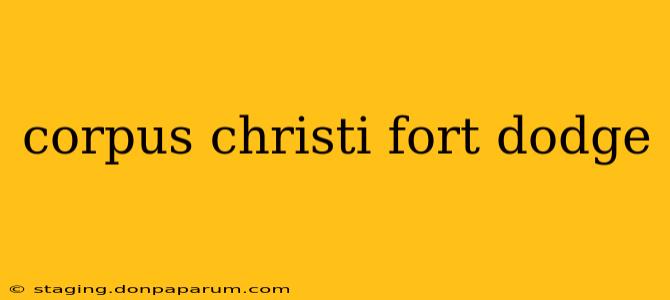While seemingly disparate at first glance, Corpus Christi, Texas, and Fort Dodge, Iowa, offer fascinating contrasts and comparisons as American cities. Understanding their unique characteristics requires exploring their history, economies, and cultures. This exploration will highlight the distinct identities of these two communities, revealing both their differences and unexpected similarities.
Corpus Christi: Coastal Charm and Energy Hub
Corpus Christi, nestled on the Texas Gulf Coast, boasts a vibrant coastal culture shaped by its maritime history and proximity to the Gulf of Mexico. Its economy, once heavily reliant on fishing and shipping, has diversified significantly, incorporating significant energy and petrochemical industries.
A Deep-Rooted History:
The city's origins lie in its strategic location along the coastline, making it a vital port and center for trade since its early days. Spanish colonization left its mark, evident in the city's architecture and historical sites. The development of the oil and gas industry profoundly impacted Corpus Christi's growth, transforming it into a major energy hub.
Modern Corpus Christi:
Today, Corpus Christi is a blend of old and new. The bustling port continues to be a crucial economic driver, alongside the thriving energy sector. Tourism plays a significant role, attracting visitors to its beautiful beaches, the Texas State Aquarium, and its rich history. This blend of industry and tourism creates a dynamic and multifaceted city.
Fort Dodge: Heartland Industry and Natural Beauty
Fort Dodge, situated in the heart of Iowa, presents a starkly different picture, yet one equally compelling. Its history is interwoven with the development of the American Midwest, from its early frontier days to its rise as an industrial center. Unlike Corpus Christi's coastal landscape, Fort Dodge is defined by its prairie setting and the nearby gypsum mines.
A History Forged in Industry:
The city's name originates from a fort established during the early 19th century. The discovery of gypsum resources significantly propelled Fort Dodge's growth, leading to the development of related industries. Agriculture remains a significant part of the local economy, reflecting the broader agricultural landscape of Iowa.
Modern Fort Dodge:
While maintaining its industrial roots, Fort Dodge has successfully diversified its economy. It's home to a variety of industries and businesses, demonstrating a resilience and adaptability to changing economic landscapes. The city also benefits from a strong sense of community and civic pride, fostering a welcoming and supportive environment.
Contrasts and Unexpected Parallels:
While geographically and culturally distinct, both Corpus Christi and Fort Dodge share some surprising commonalities. Both cities boast a rich history rooted in their respective geographical advantages. Both have successfully adapted their economies to meet the challenges of modern times, demonstrating resilience and adaptability. While one embraces the coast, the other thrives in the heartland, both maintain a strong sense of local identity and community spirit.
Conclusion:
Corpus Christi and Fort Dodge, though vastly different in their setting and primary industries, stand as compelling examples of American cities that have shaped their unique identities while successfully navigating the complexities of economic development and social growth. Understanding their individual stories enriches our understanding of the diversity and resilience of American communities.

